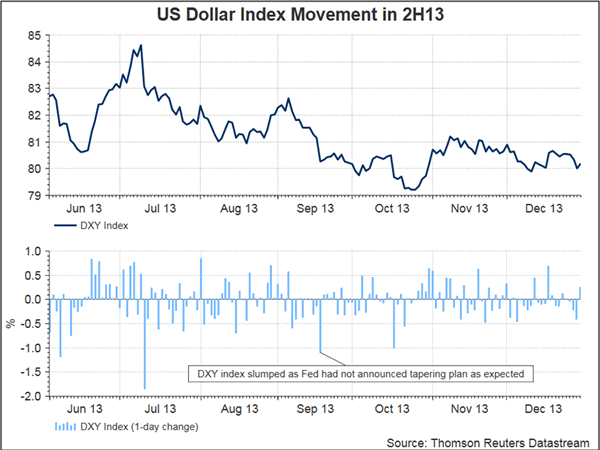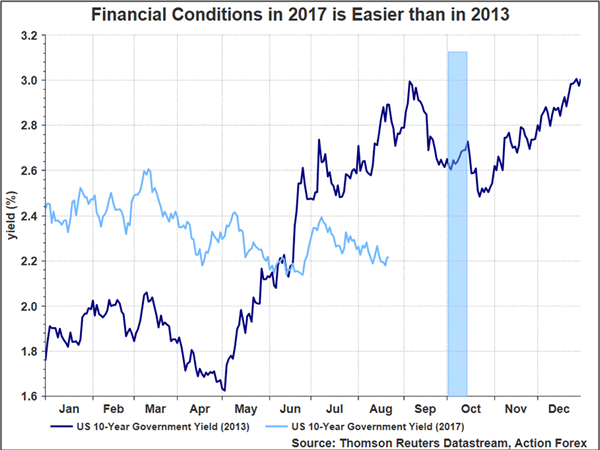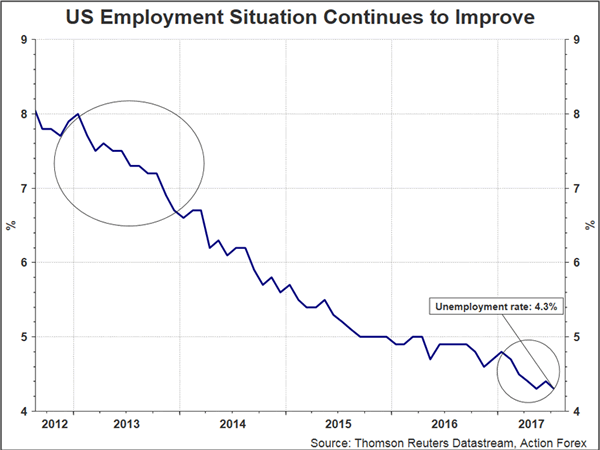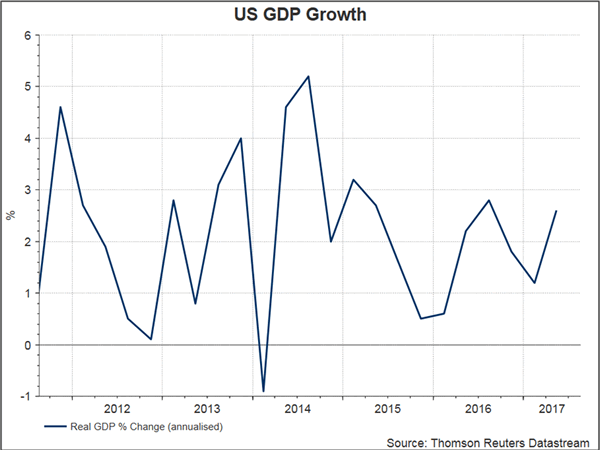Recent comments from US Treasury Secretary Steven Mnuchin and Senate Majority Leader Mitch McConnell appeared to have lifted market confidence that the government will eventually be able to raise the debt ceiling and avoid default. While our base case is that a debt ceiling would be suspended or raised, and the government would avoid a shutdown, we do not expect things to go smoothly and it would likely be a last-minute deal. US’ politics has been under the spotlight since Donald Trump has become the president. At over 200 days in office, Trump’s Russia scandal probably caught most attention, followed by the war of words with North Korean leader Kim Jongun. More recently, Trump dissolved several business advisory councils after resignations of a number of CEOs. On economic achievement, Trump has failed to pass the healthcare reform bill and was unable to kick start any pro-growth or tax policy. The government’s debt issue is close watched and volatility of the stock markets could increase as we approach the deadline.
The Congress suspended the debt ceiling in November 2015 until mid-March 2017. Since then, the Treasury has been using "extraordinary measures" to raise capital. In a June report, the Treasury revealed that the extraordinary measures include (1) suspending sales of State and Local Government Series Treasury securities; (2) redeeming existing, and suspending new, investments of the Civil Service Retirement and Disability Fund and the Postal Service Retiree Health Benefits Fund; (3) suspending reinvestment of the Government Securities Investment Fund; and (4) suspending reinvestment of the Exchange Stabilization Fund. However, these measures will run out in early September and the Treasury would resort to incoming tax receipt for financing until September 29. Therefore, it would be critical to raise the debt ceiling by that day. Mnuchin has suggested that he strongly prefer to have "a clean raise of the debt limit", while McConnell added that there is "zero chance – no chance – we won’t raise the debt ceiling. No chance".
Freedom Caucus Links Vote to Borrowing and Spending Restrictions
The confidence might come from the fact that, together with a Republican president, the GOP is also control of both the House and the Senate. During the debt ceiling crisis in 2011 and 2013, the Congress was split under a Democrat President, while the Congress was controlled by Republicans under a Democrat President in 2015. Failure to pass the healthcare reform bill has already reflected that a full control by one party does not necessarily be more efficient. The vote amongst Republicans is not unanimous. The House Freedom Caucus, consisting of conservative and libertarian Republican members of the United States House of Representatives, is split on whether they would link a spending cut with the debt-ceiling vote.
60 Votes Needed in Senate
In the Senate where Republicans take 52 seats, 60 votes are needed to pass debt ceiling legislation. So far, Democrats’ position regarding a "clean" raise has been ambiguous. Democrat leaders Schumer and Pelosi threatened in June they might not vote for the raise in debt ceiling if the tax cut for the very wealthy might result in huge increases the deficit. Yet, they later changed mind and noted that they would support a "clean" bill, free of conditions. There is no recent update on Democrats’ view.
Will Fed Postpone Announcement of Balance Sheet Reduction?
2013
Bearing a resemblance to the situation in 2013, one may worry about Fed’s move in light of possible government shutdown. Back in 2013, the FOMC, led by the then Chair Ben Bernanke, noted at the July meeting minutes that "if economic conditions improved broadly as expected, the Committee would moderate the pace of its securities purchases later this year. And if economic conditions continued to develop broadly as anticipated, the Committee would reduce the pace of purchases in measured steps and conclude the purchase program around the middle of 2014". This had spurred strong expectations that the announcement would be made in September. Yet, haunted by threats of not raising debt ceilings by Republicans at the time, Bernanke refrained from making related announcement at the meeting on September 17-18. As noted in the minutes, the Fed acknowledged that "a number of significant risks remained, including those related to the potential economic effects of the sizable increases in interest rates since the spring, ongoing fiscal drag, and the possible fallout from near-term fiscal debates". Thus, it decided to "await more evidence that progress will be sustained before adjusting the pace of its purchases". US dollar slumped with the DXY index sinking over -1% on the day of this dovish announcement.

The FOMC meeting was followed by a 16-day government shutdown from October 1. The shutdown delayed the releases of key economic data including the September employment report, CPI and PPI data, as well as GDP growth estimates. Undoubtedly, the accuracy of the delayed data was questionable as there was data collection in the first half of October was suspended due to the shutdown.
2017
The July minutes noted that "participants generally agreed that, in light of their current assessment of economic conditions and the outlook, it was appropriate to signal that implementation of the program likely would begin relatively soon, absent significant adverse developments in the economy or in financial markets". The market has almost fully priced in an announcement at the meeting on September 20, 9 days before the deadline of raising the debt ceiling so as to avoid additional payment delays and a default. We do not expect the Fed would postpone the announcement this time. The chance that a debt ceiling can be raised on time is much higher this time so that the likelihoods of a default and a government shutdown are lower. Moreover, economic developments are more upbeat and financial conditions more accommodative today than in 2013. On the economic developments, the unemployment rate this year has fallen about three percentage points from four years ago, while GDP growth is also less volatile. Therefore, we expect the Fed would ignore the noise of a potential shutdown and make formal announcement of balance sheet reduction in September.



